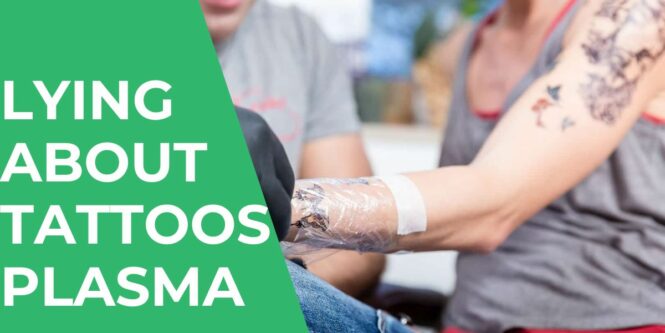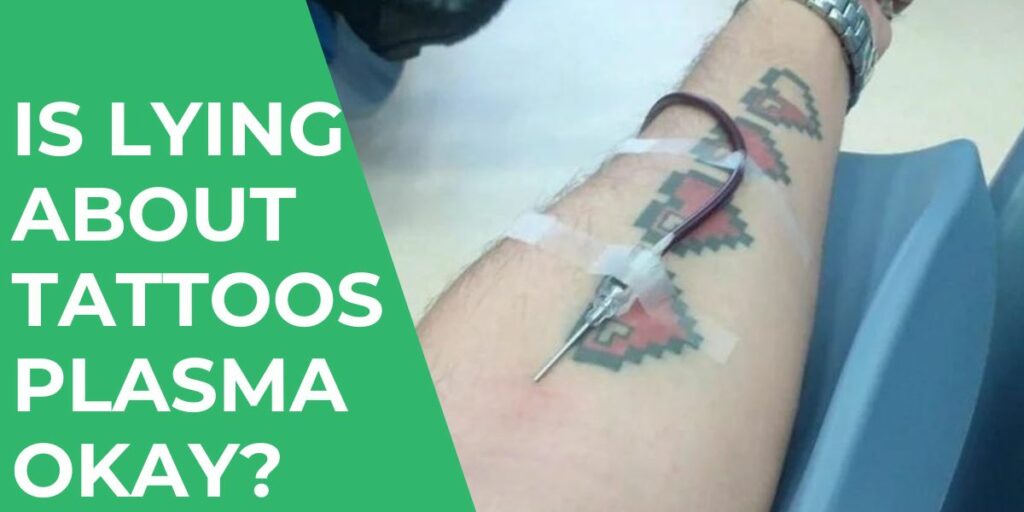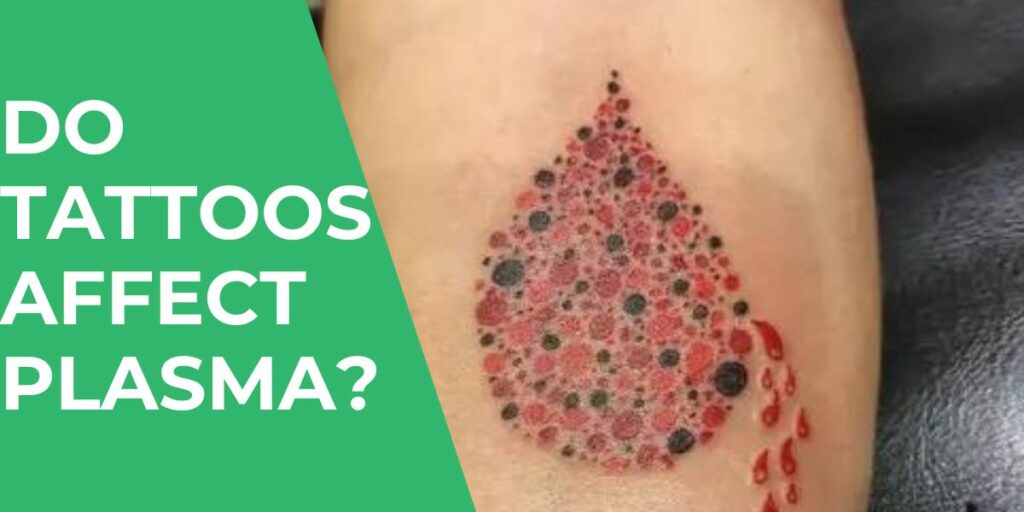
I discussed plasma donation’s importance with my friend the other day.
He just got a tattoo on his right arm, really got hooked and couldn’t help the plasma donation and lying about it.
In this article, I’ll discuss the truth about lying about tattoos plasma, the consequences of lying to donate plasma, and why it’s important to be honest about your tattoos when donating plasma.
Is Lying About Tattoos Plasma Okay?

Lying about tattoos when donating plasma is not okay. It can lead to serious health risks for the donor and recipient, and being truthful about your tattoos is important.
Did you just sustain a bruise and wonder if you can still donate plasma? Check my post on Can You Still Donate Plasma with A Bruise to unravel the facts and myths about it.
Reasons for Lying About Tattoos Plasma
These are reasons people lie about tattoos plasma:
- To avoid being turned away from plasma donation: Some people may lie about their tattoos to be able to donate plasma, despite having been advised not to due to the risk of blood-borne infections.
- To make money: Some plasma donation centers pay donors for their plasma, which can be a lucrative side hustle. For this reason, people can lie about tattoos to make money from plasma donations. However, lying about tattoos to qualify for donation can be dangerous, and the financial gain is not worth the risk.
- To avoid social stigma: Some circles still have a stigma surrounding tattoos. This might cause donors to feel embarrassed or ashamed to admit tattoos. However, it’s important to prioritize honesty over social stigma.
Consequences of Lying to Donate Plasma
These are the consequences of lying to donate plasma:
- Increased risk of blood-borne infections: Tattoos can increase the risk of contracting infections. This includes infections like hepatitis B and C, HIV, and other viruses. Lying about tattoos can lead to plasma being used for transfusions or other medical procedures without the necessary screening, putting the recipient at risk.
- Compromised plasma quality: Plasma from tattoo donors must be thoroughly screened to ensure its safety. Lying about tattoos can result in plasma being used without proper testing, compromising its quality and effectiveness.
- Legal consequences: Lying about tattoos when donating plasma is considered fraud and can result in legal consequences.
- Personal health risks: Donating plasma can also pose personal health risks to donors with tattoos, such as an increased risk of infection at the site of the tattoo.
Check this article on the Risks of Donating Plasma to learn in depth about the consequences of lying to donate plasma.
Can Plasma Centers Tell if You Got a Tattoo?
Plasma centers have methods to detect if a donor is lying about their tattoo history, including physical examination and cross-checking with past donations.
Lying about tattoos can have serious consequences for the recipient of plasma derived products and is not recommended.
Importance of Honesty in Plasma Donation
The importance of honesty in plasma donation includes the following:
- Ensuring donor and recipient safety: Honesty about tattoos and medical history is essential to ensure the safety of both the donor and recipient. Lying about tattoos can lead to transmitting blood-borne infections, which can have serious health consequences.
- Maintaining plasma quality: Plasma must be thoroughly screened and tested before being used for medical procedures. Honesty about tattoos and other medical history ensures that plasma is high-quality and safe for use.
- Legal compliance: Lying about tattoos when donating plasma is considered fraud and illegal. Honesty about tattoos and other medical history is necessary to comply with the law and avoid legal consequences.
- Ethical responsibility: Plasma donation is a selfless act of generosity and carries an ethical responsibility, to be honest and transparent about medical history and tattoos.
What Happens if I Donate Plasma After Getting a Tattoo?
If you donate plasma after getting a tattoo, it can increase the risk of blood-borne infections. These infections can be transmitted through donated plasma.
If you are a regular plasma donor, check my article on the Long Term Side Effects of Donating Plasma Regularly for an understanding of the potential side effects that you could have in the longer term.
The Tattoo Screening Process for Plasma Donation
Here is the tattoo screening process for plasma donation:
- Registration: When you arrive at the plasma center, you must register as a donor.
- Medical history questionnaire: After registration, the staff will give you a medical questionnaire to complete. The questionnaire contains questions about your medical information.
- Physical examination: After completing the questionnaire, you will undergo a physical examination. This is performed by medical staff to check for any infection or illness.
- Tattoo screening: Before donating plasma, you must disclose any tattoos or piercings received in the past 3 months. This includes any tattoos or piercings not performed in a licensed establishment. If you have recently received a tattoo, the healthcare professional will examine the area for signs of infection or inflammation.
- Waiting period: You must wait a certain period before you can donate plasma if you have received a tattoo in the past 3 months.
- Repeat screening: If you have previously disclosed a tattoo, you will be asked to repeat the screening process at each subsequent donation. This is done to ensure that the waiting period has been observed and there are no signs of infection.
Why Plasma Centers Ask About Tattoos
Plasma centers ask about tattoos to ensure the safety of the plasma supply and prevent the transmission of bloodborne diseases like hepatitis and HIV. Honesty about recent tattoos or piercings is important to protect the donor and recipient.
Have you ever wondered why they check your elbow during plasma donation? Read my post on Why Do They Check Your Elbows When Donating Plasma to discover the reasons.
Why Do Plasma Centers Require a Waiting Period for Recent Tattoos?
Plasma centers require a waiting period for recent tattoos to clear any potential infections. The waiting period allows time for the donor’s body to heal and for any signs of infection to become apparent.
Do Tattoos Affect Plasma?

Tattoos do not directly affect plasma, but recent tattoos can affect a person’s eligibility to donate plasma due to the risk of infections.
How to Properly Disclose Your Tattoos for Plasma Donation
Be honest and provide complete information about any tattoos you have received in the past 3 months or any tattoos not performed in a licensed establishment. Follow the healthcare professional’s instructions and disclose any signs of infection or inflammation in the tattoo area.
The Roles of Plasma Donation Centers in Preventing Lying About Tattoos Plasma
Here are the roles of plasma donation centers in preventing lying about tattoos plasma:
- Ensuring donors complete a medical history questionnaire
- Conducting a physical examination
- Asking donors to disclose any tattoos or piercings
- Checking for visible signs of infection or inflammation
- Enforcing waiting periods for recent tattoos
- Requiring repeat screening for previous disclosures
- Implementing penalties for lying or withholding information.
Can Plasma Centers See if You Donated Plasma Somewhere Else
Plasma centers can see if you have donated plasma elsewhere through a national database called the National Donor Deferral Registry. This ensures that donors do not exceed the maximum allowable number of donations and prevent transmitting infectious diseases.
The Waiting Period for Recent Tattoos
Plasma centers require a waiting period of one year for plasma donation if the tattoo was done in a professional establishment. The waiting period is to ensure any potential infection or disease has cleared.
How Can I Ensure My Tattoo is Safe for Plasma Donation?
Here are steps to ensure your tattoo is safe for plasma donation:
- Wait for the recommended waiting period before donating plasma.
- Ensure the tattoo was done in a professional, licensed establishment.
- Check that the tattoo artist followed proper safety protocols, including using sterile needles and equipment.
- Monitor the tattoo for any signs of infection or complications before donating.
Frequently Asked Questions on Lying About Tattoos Plasma
Here are the frequently asked questions on Lying About Tattoos Plasma:
Why is It Important to Be Honest About My Tattoo History When Donating Plasma?
Being honest about tattoo history is crucial for ensuring the donor and recipient’s safety. Undisclosed tattoos can increase the risk of transmitting infectious diseases through plasma donation.
What Should I Do if I’ve Lied About My Tattoos for Plasma Donation?
If you have lied about your tattoos for plasma donation, come forward and disclose the truth to the plasma center.
Conclusion
Lying about your tattoo history when donating plasma is not only unethical, but it can also have serious health consequences. It is important to disclose your tattoo information truthfully to the plasma center staff to ensure your safety and those of others who may receive your plasma products.
Plasma centers have strict protocols to prevent infectious disease transmission, and lying about tattoos can compromise those efforts. If you have lied about your tattoo history, it is important to provide the correct information. Doing so can ensure you make a responsible and ethical contribution to the plasma donation process.

